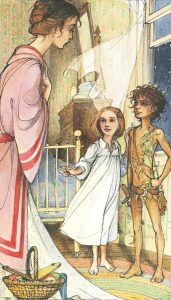Introduction to J.M. Barrie’s life

J M Barrie was a Scottish dramatist and novelist who is best known as the creator of Peter Pan, the boy who refused to grow up.
Early Life of Barrie
Barrie was merely six years old when his brother died, leaving him shocked and sending his mother into a lifelong depressive daze. That is the main reason why he wanted to recapture his happy childhood years and his adult self retained that childlike innocence. He studied at the University of Edinburgh and spent two years on the Nottingham Journal before settling in London as a freelance writer in 1885. His first successful book was Auld Licht Idylls (1888).
Most of his early works are marked by a typically quaint Scottish dialect, whimsical humour and comic clowning, pathos, and sentimentality. At a New Year’s Eve dinner in 1897, he met Sylvia Llewellyn Davies, the daughter of writer and caricaturist George du Maurier, a favourite author of his. Soon, he made his way into the Davies household, amusing Sylvia and her two boys. He also provided financial support to the family. It was through them, that he began to live again the experience of childhood. These experiences gave birth to Peter Pan. His marriage ended in divorce in April 1910. Sylvia died in 1907. Barrie, along with their nurse, Mary Hodgson, assumed guardianship over the boys.
Peter Pan or The Boy who wouldn’t grow up

The play Peter Pan; or the boy who wouldn’t grow up, was first produced in December 1904, Though the popular conception of the character is that of a charmingly impish figure, the Peter of the play and books is anarchical, selfish, and murderous. Notes by Barrie indicate that Peter was in fact intended to be the true villain of the story. Barrie wrote elaborate stage directions which are sometimes more rewarding than their dialogue itself. He proved himself a master of stage effects and of the delineation of character.
For his work, Barrie was created a baronet in 1913 and was awarded the Order of Merit in 1922. He later became president of the Society of Authors in 1928 and then chancellor of the University of Edinburgh in 1930.